
views
Saying Prayers
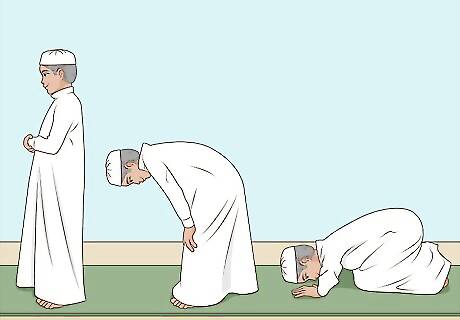
Pray salat ul-fajr, the pre-dawn prayer. On the first day of Eid, Muslims wake up early and gather at an outdoor location or mosque to say prayers. The salat ul-fajr is one of the five daily prayers that are said every day regardless of the month, so begin with this one before moving on to special prayers. Do salat ul-fajr by performing two rakats, or series of movements, each of which involves standing, bowing, and prostrating.

Recite the takbir. After the morning prayers on the first day of Eid, Muslims return home to wash up and dress in new clothes. Then they walk back to their congregation again, reciting the takbir, or declaration of faith, as they go. Recite the takbir by saying “Allaahu Akbar” a series of times and raising your hands to your ears. This translates to “God is most great.”
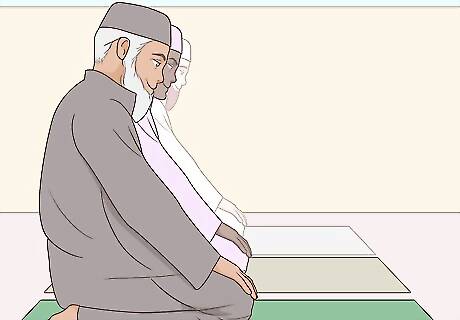
Perform the Eid prayer. Once everyone has returned to their mosque or outdoor gathering spot on the first day of Eid, there's a short sermon, typically given by an imam, and then all men and women perform the obligatory Eid prayer. Follow the imam's movements as he performs two rakats and six takbirs.
Feasting and Decorating
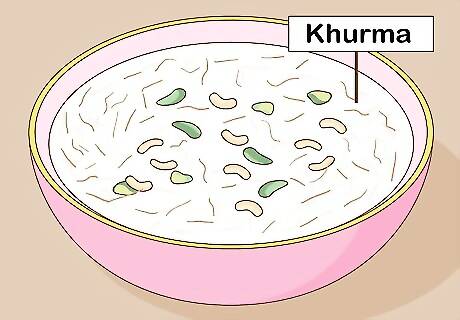
Start the day with seviyan, or vermicelli noodles. Toast the noodles and serve them dry, or boil them and serve them as a milky, soupy pudding called sheer khurma. This is the traditional Eid breakfast in India, Pakistan, and Bangladesh. Dates are a popular breakfast to have before heading out for pre-dawn prayers. Other traditional breakfasts include buttered couscous or buffalo cream with honey and bread.
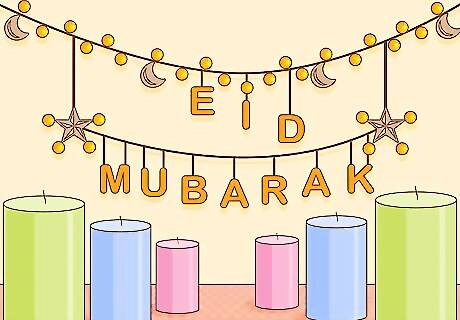
Put up lights in your home. As part of the festivities, Muslims decorate their homes with lights. Place string lights, candles, or lanterns around your house, and put up festive banners made of paper stars.
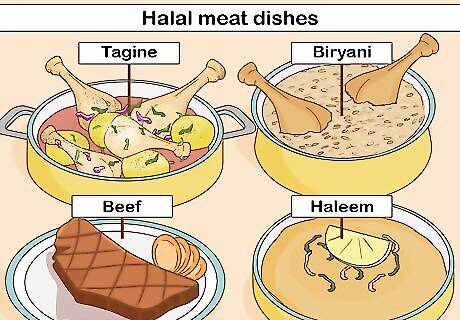
Eat halal meat dishes. A variety of meat dishes are enjoyed on Eid, but all must be halal, which means no pork or swine. One of the most popular dishes in Northern Africa is tagine, a savory stew named after the earthenware dish it's cooked in. Typical ingredients include chicken, beef, or fish mixed with vegetables and spices. Other popular Eid dishes are beef or lamb kebobs, biryani (a basmati rice dish), and haleem (meat slow-cooked with grains).
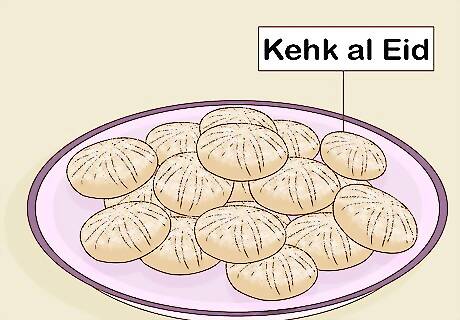
Bake traditional treats called kahk al Eid. Families gather together to make, swap, and eat these sugar cookies for Eid. They often have designs on them made with special stampers and contain one of three fillings: pistachios, walnuts, or dates. Create a basic dough of flour, powdered sugar, butter, and milk. Then roll it into little balls and press your thumb into each one to create an indentation for your filling. Once you add the filling, re-roll the balls and bake until golden.
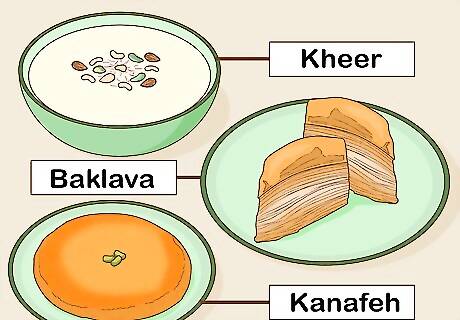
Indulge in a variety of sweets. There are many more sweets enjoyed on Eid besides kahk, though the type depends upon the culture. Some examples include kheer (Indian rice pudding), baklava (a phyllo dough pastry popular in West Asia), and kanafeh (a Turkish specialty with cheese, semolina, noodles, and syrup).
Giving Gifts
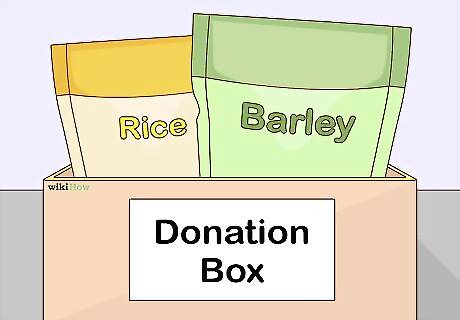
Donate food to charity. A few days before Eid begins, each Muslim family makes a donation known as sadaqah al-fitr (charity of fast-breaking). It is a donation of food like rice, barley, and dates given to less fortunate families so that they can feast and celebrate on the holiday.
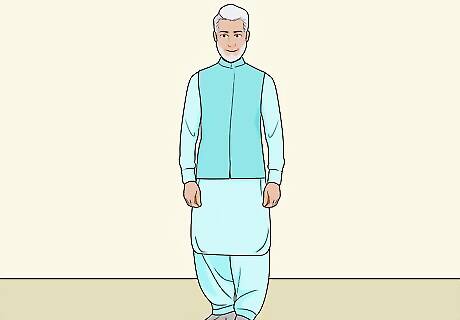
Give and wear new clothes. Clothing is a popular gift to give to relatives and children so that they can look their best on the first day of Eid. Wear the new clothes you get, if any (or the best clothes you have), to perform the Eid prayer. Along with dressing your best, you should also brush your teeth, bathe, and wear perfume.
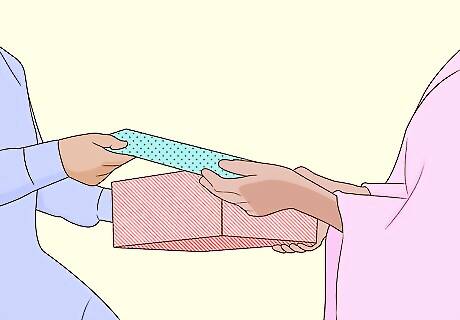
Visit relatives and give them gifts. Families make their rounds visiting the homes of relatives and offering their greetings for the holiday. If your family is quite large, these visits need to be kept short so there is time to see everyone. When you visit their homes, give relatives new clothes or sweet treats that you baked yourself, and in return they should offer you food that they prepared for the holiday.
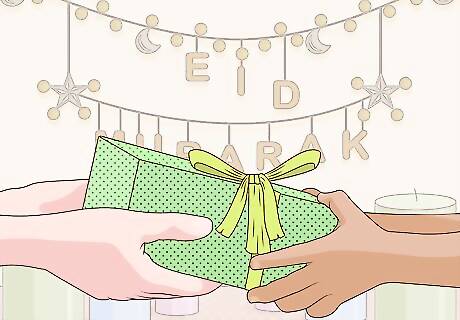
Give gifts to children. While gifts can be exchanged among all family members, they are most often given to children. In Asian countries, elders give eidi (money) to children as a show of goodwill. Other popular gifts to give children are new clothes, special Eid outfits, and toys.















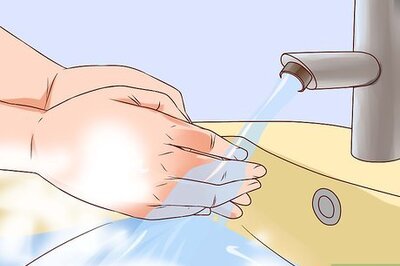
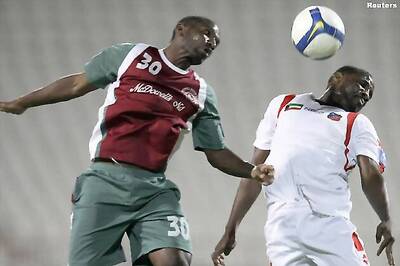

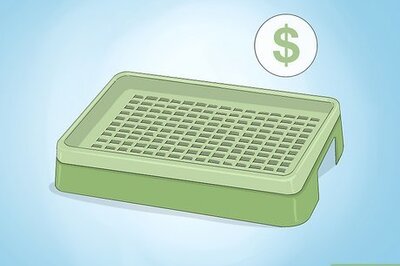
Comments
0 comment